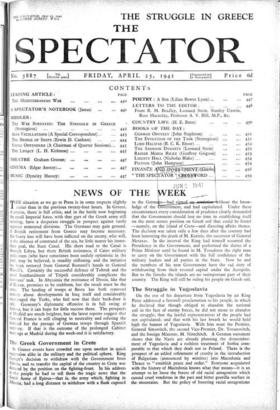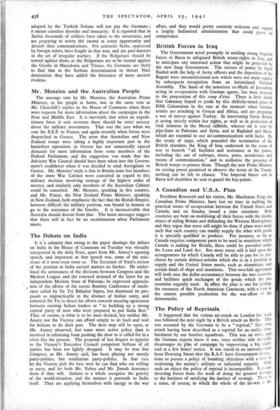The Struggle in Yugoslavia
On the eve of his departure from Yugoslavia by air King Peter addressed a farewell proclamation to his people, in which he declared that though obliged to abandon the national soil in the face of enemy forces, he did not mean to abandon the struggle; that the lawful representatives of the people had not capitulated; and that with his last breath he would hold high the banner of Yugoslavia. With him went the Premier, General Simovitch, the second Vice-Premier, Dr. Yovanovitch, and the foreign Minister, M. Nintchitch. A German statement shows that the Nazis are already planning the dismember- ment of Yugoslavia and a ruthless treatment of Serbia com- parable to that which they dealt out to Poland. There_ is the prospect of an added refinement of cruelty in the introduction of Bulgarians (announced by wireless) into Macedonia and Thrace to "establish peace and order." Everyone acquainted with the history Of Macedonia knows what that means—it is an attempt to let loose the forces of old racial antagonism which caused cruel vendettas in the past and bitter guerilla warfare in the. mountains. But the policy of fostering racial antagonisms adopted by the Turkish Sultans will not pay the Germans ; it means ceaseless disorder and insecurity. It is reported that in Serbia thousands of soldiers have taken to the mountains, and are preparing to worry the enemy at every opportunity and disturb their communications. For centuries Serbs, oppressed by foreign rulers, have fought in that way, and are past-masters in the art of irregular warfare. If the Bulgarians should be turned agiinst them, as the Bulgarians are to be turned against the Greeks in Macedonia and Thrace, the Germans are likely to find that to the Serbian determination to thwart Nazi domination they have added the bitterness of more ancient rivalries.



























